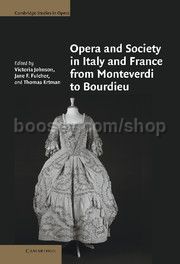Opera and Society in Italy and France from Monteverdi to Bourdieu
Opera and Society in Italy and France from Monteverdi to Bourdieu
* Estimated price converted from UK retail price
This edited volume is the first book to bring together academic specialists writing on the multi-media operatic form from a range of disciplines: comparative literature, history, sociology, and philosophy. The presence in the volume’s title of Pierre Bourdieu, the leading cultural sociologist of the late twentieth century, signals the editors’ intention to synthesize recent advances in social science with recent advances in musicological and other scholarship on opera. Through a focus on opera in Italy and France, the contributors to the volume draw on their respective disciplines both to expand our knowledge of opera’s history and to demonstrate the kinds of contributions that stand to be made by different disciplines to the study of opera. The volume is divided into three sections, each of which is preceded by a concise and informative introduction explaining how the chapters in that section contribute to our understanding of opera.
Contents
Foreword Craig Calhoun; Introduction: opera and the academic turns Victoria Johnson; Part I. The Representation of Social and Political Relations in Operatic Works: Introduction to Part I Jane F. Fulcher; 1. Venice’s mythic empires: truth and verisimilitude in Venetian opera Wendy Heller; 2. Lully’s on-stage societies Rebecca Harris-Warwick; 3. Representations of le peuple in French opera, 1673–1764 Catherine Kintzler; 4. Women’s roles in Meyerbeer’s operas: how Italian heroines are reflected in French grand opera Naomi André; 5. The effect of a bomb in the hall: the French ‘opera of ideas’ and its cultural role in the 1920s Jane F. Fulcher; Part II. The Institutional Bases for the Production and Reception of Opera: Introduction to Part II Thomas Ertman; 6. State and market, production and style: an interdisciplinary approach to eighteenth-century Italian opera history Franco Piperno; 7. Opera and the cultural authority of the capital city William Weber; 8. 'Edizione distrutte' and the significance of operatic choruses during the Risorgimento Philip Gossett; 9. Opera in France, 1870–1900: between nationalism and foreign imports Christophe Charle; 10. Fascism and the operatic unconscious Michael P. Steinberg and Suzanne Stewart-Steinberg; Part III. Theorizing Opera and the Social: Introduction to Part III Victoria Johnson; 11. Opera and society (assuming a relationship) Herbert Lindenberger; 12. Symbolic domination and contention in French music: shifting the paradigm from Adorno to Bourdieu Jane F. Fulcher; 13. Rewriting history from the losers’ point of view: French grand opera and modernity Antoine Hennion; Conclusion: Towards a new understanding of the history of opera? Thomas Ertman; Bibliography.
Contributors
Craig Calhoun, Victoria Johnson, Jane F. Fulcher, Wendy Heller, Rebecca Harris-Warrick, Catherine Kintzler, Naomi André, Thomas Ertman, Franco Piperno, William Weber, Philip Gossett, Christophe Charle, Michael P. Steinberg, Suzanne Stewart-Steinberg, Herbert Lindenberger, Antoine Hennion




